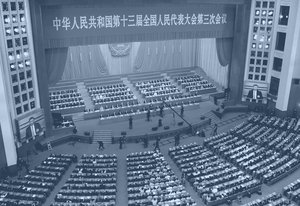This transcript was completed with the aid of computer voice recognition software. If you notice an error in this transcript, please let us know by contacting us here.
Hong Shen: There are certain discrepancies between the dominant Western discourse and China's domestic discourse. And I think at least we should bring those two discourse together and carefully analyze what is actually happening instead of assuming one of them as correct and the one of them as simply liar.
Taylor Owen: Hi, I'm Taylor Owen, and this is Big Tech.
When we talk about Chinese big tech, it usually sounds something like this.
[CLIP]
Donald Trump: We're looking at TikTok. We may be banning TikTok. We may be doing some other things. There are a couple of options.
Melissa Lee: Obviously, Kelly, the concern is the security risk here in terms of how TikTok handles user data and whether or not it goes back to China or the communist party.
SOURCE: CNBC Television YouTube Channel https://youtu.be/061fwvWZHgo
“President Donald Trump: Looking at banning TikTok or a lot of other options”
July 31, 2020
[CLIP]
Eric Schmidt: By 2020, they will have caught up. By 2025, they will be better than us. And by 2030, they will dominate the industries of AI.
SOURCE: The Artificial Intelligence Channel https://youtu.be/oWH1wZhiL6A
“China Might Beat The US in Artificial Intelligence - Eric Schmidt”
November 2, 2017
Taylor Owen: That's Donald Trump talking about the social media platform, TikTok and former Google CEO, Eric Schmidt, talking about the rise of Chinese AI. These clips reflect increasingly common narratives around China's tech industry, which is usually positioned in direct conflict with American companies and American values. A narrative of a digital cold war whereby the only thing that can stop a rising China is American ingenuity is deeply self-serving for Silicon valley and is being used to help them stave off domestic regulation. But Hong Shen says this narrative risks getting the very history and nature of Chinese technology wrong. Hong is a system scientist at Carnegie Mellon and the author of a new book called Alibaba: Infrastructuring Global China. Hong argues that China's tech sector is actually deeply intertwined with the global economy. Alibaba, for instance, was at one time, primarily owned by Yahoo and SoftBank and Western technology companies often rely on Chinese labour in their supply chains, both to build their hardware and to train their AI. She also argues that Chinese tech isn't simply an extension of the state as Jack Ma can attest. So this us versus them arms race narrative propagated by both Silicon valley CEOs and the US government is, according to Shen, fraught to say the least. This is the first of two episodes we're going to do on China this season. The next one we'll focus on China's domestic surveillance network and the technologies that are being used to survey and oppress the country's minorities, and which are increasingly being exported to illiberal regimes around the world. There are obviously concerning human rights violations happening in China right now, many of which are enabled by technology and the expansion of Chinese tech into other parts of the world may be cause for genuine security concerns. But framing the Chinese tech sector as simply an adversary to Silicon valley in the US doesn't tell the whole story. It glosses over just how interconnected the Chinese and American tech industries really are. So here, to complicate this story for us, is Hong Shen.
I want to start with one of the more common narratives around the Chinese state and the internet, which you could broadly sort of characterize as the Chinese government fearing the democratizing potential of the internet, built a firewall that allowed them to both restrict information from the outside world and control the information from within China, that its citizens received. What does this narrative get wrong about what played out in that early period of internet development in China?
Hong Shen: Yeah, I think that's a great question. From my perspective and based on my research, I think definitely more and more, this so-called the dominant discourse around the Chinese internet is become more and more inadequate because as you mentioned, like for a long time, we think the only interest of China is to build this so-called inward-looking national internet that is sealed by the great firewall. And that is actually unplugged from the international network. But from my research, this discourse actually suffers at least from two major points. First of all, people have this very idealized imagination of the potential democratize power of technology. So they often think that this network technology will free, especially the global south countries from authoritarianism. So in this way, they often think that the so-called great firewall, the only purpose of that is to contain this like freedom of speech and so forth. But the great firewall is not only a political tool. It is also an economic tool to shield the global tech giants from the Chinese market. And this is highly actually related to why China now has a group of globally prominent tech giants. Precisely because in the early stage, the Chinese state using a central tool to protect or to reserve its domestic market for its home-owned, home-grown tech giants.
Taylor Owen: So it bought the tech industry in China time to develop their own products to then go out and compete with the American tech companies later?
Hong Shen: Yes. So for sure, the great firewall has its political aspect of political control, but also it is also a economical shield. And on the other hand, I think the second major misunderstanding of this dominant discourse is I think it overlooked China's relationship with the global internet. That is the rise of China's global internet is actually being assisted by transnational capital. For example, we can recall that Yahoo was actually one of the early investors in Alibaba and in 2005 it actually owned literally 30% of the company. So until very recently, Alibaba was like more owned by transnational capital than Chinese owned national capital.
Taylor Owen: Yeah which is... I mean, it is remarkable when you think about sort of another largely Western narrative that's emerged, which is of the close proximity and symbiosis, or even control of Chinese tech companies by the Chinese state. Talk more about that narrative and how that misses some of the nuances.
Hong Shen: Yeah, sure. I think that's a great point. So the dominant discourse often perceives China's, especially outward digital expansion as a coherent government action. So Chinese state is indeed dictating those companies for their actions, but actually I think this perception is overly simplistic. So we often see actually conflicts not only among different Chinese internet capitalists, but also between those internet capitals and the state entities. I think the most recent cancellation of Ant IPO is a great example to illustrate this point.
[CLIP]
David Faber: We've been following the prospective IPO of Ant financial, the largest initial public offering of all time. … All of that appears this morning to be going up in smoke, the Shanghai exchange. And we also know Hong Kong as well have both essentially suspended the listing this morning.
Eunice Yoon: This does come after Jack Ma as well as other top executives at Ant had been summoned on Monday to talk to the regulators at the banks. … And it also comes after a speech that he made on Friday … in which he was highly critical of regulators for not supporting the FinTech industry.
SOURCE: CNBC Television YouTube Channel https://youtu.be/you7qrCz5MM
“Hong Kong and Shanghai suspends Ant Group’s record $34.5 billion IPO”
November 3, 2020
Taylor Owen: Let's hear more about that because I... I mean, look, I think again for watching this somewhat naively from the outside, I think that shocked a lot of people. People who assumed Chinese tech companies, even if was some foreign capital coming into it, we're working in much more close alignment to Chinese policy. I mean, all of a sudden you have one of the biggest tech companies in the world, and one of the most prominent heads of it seemingly in conflict with the Chinese state. So maybe you could just, just, just some framing for our listeners. And so what is Alibaba and, and what happened there over the past year?
Hong Shen: So I think now probably many of us have aware of that Alibaba is one of the most powerful e-commerce company, not only in China, but also in global internet. So basically it's a combination of Amazon and eBay and it also command through a variety of financial vehicles, like one of the most valuable fintech tool in the world that is so-called Alipay, the mobile payment system that is so widely adopted in China and in many south east Asia countries.
Taylor Owen: And used for everything, right? I mean, it's a full payment system.
Hong Shen: Yes, exactly. So in one of my papers, I argue that Alipay has become infrastructuralized in China means people are using it basically as a basic financial infrastructure.
Taylor Owen: Yeah. You've written, I think that you can't even buy apples without mobile payments.
Hong Shen: Yeah, exactly. Even beggars on the street are using Alipay to receive donations so you can see how popular it is. So then suddenly I think it's actually, that's another point I want to emphasize that is there is a much needed a historical perspective. We need to adopt to look at the relationship between internet capitals and Chinese state entities. So if you look at a development of Alipay in the past 10 years. There are actually existing a number of conflicting points. So the cancellation of Ant IPO is only the recent, probably most prominent points in this longer history. So this by no means to say like Jack Ma has always have a good relationship with Chinese regulators until recently. That is not correct. So if you look at history, you can see there are a number of conflicts and power struggles between Alipay, different entities of Chinese state apparatus and even local governments in this longer history. They're starting from, I think last year we indeed saw much more prominent conflicts between Alipay and the Chinese state entities. In particular, there is an event. So Jack Ma's stepping out of the line in public criticism of the banking regulators in China, basically he's repeating lots of points he has raised out over the years. That the Chinese banking industry is too old fashioned and needs like digital interrupters, very similar to the discourse we heard actually around the world. So then suddenly the upcoming Ant IPO was suspended by the Chinese regulators.
Taylor Owen: I mean, this is clearly a more global company that often gets attributed to it with some more distance from the Chinese state than maybe people were aware of. But you also argue that it's not really a fully capitalist company either. So it almost feels like it's something different than we're used to. It's not a state owned company. I think we understand as public utilities and those sorts of things or a pure binary private entity, it seems to be some sort of hybrid. Is that fair?
Hong Shen: Yeah. I think there's a like larger background that often being overlooked in the current discourse. That is, we often assume that China's already a market economy, but especially as the CCP was still holding the so-called socialist ideology in its control of its domestic and even global expansion. So Alibaba in many, many cases it needs to not only like act in the direction of CCP's guidelines, but at least it has to pretend it's like really listened to state regulators in some sense. So if you look at Alipay and Alibaba's domestic initiatives, many of those initiatives, like they are building rural shopping site called the rural Taobao in China. Really, really remote areas, try to help the rural populations to get rich, to get rid of the poverty. Tried to help them to sell their local products. Sometimes those initiatives doesn't really make sense for a private company simply because it doesn't really make too much profits and so forth, but it's part of the political obligations of those companies that needs to be operated in China.
Taylor Owen: And is... The other thing that was surprising to many people about these recent events around Alibaba was that there is fairly robust competition policy enforcement occurring at the moment in China and that's almost a reaction to the protectionist policies that allowed these companies to get so large that now the government is sort of worried about their scale and a lack of innovation in the tech sector. So, they're pushing back against that scale? Some of them reaping what they sowed with that protectionism?
Hong Shen: I think Chinese government is really joining the governments all over the world, try to tackle the influence and the power of big tech companies in its domestic market. So in some sense, it's a shared concerns across governments all over the world. I think compared to other cultures, especially the US and EU China doesn't really have a very strong anti-monopoly regulations implemented its domestic market. My anticipation is, it might not be correct, just my anticipation is probably in the future there will be a hybrid type of organizations emerge. So probably the government will have some control of the... So I think government is really concerned about the power and influence of its domestic internet capital, simply because they are getting too big. And they are getting too big, partly because of what you said, the protectionism policy. And also, I think we should be aware of the numerous waves of foreign capital injected into those companies. So this is why China facing the same problem as the global internet industry, because they are founded actually by the same type of capital that is very, very shortsighted. They need to get big first. They need to get dominant in their own market. So those problems from my perspective, they're global, they're global problems.
Taylor Owen: So I'd like to talk a little bit about the global nature of these companies too and the global ambitions of the Chinese state. Another sort of broad common narrative is that some of the expansion of these companies, whether it be Huawei or Alipay or whatever it might be into global markets is in some ways, part of Chinese foreign policy. And that this is somehow part of a much broader geopolitical dynamic, where the Chinese state is using this technology infrastructure to either gain political advantage or geopolitical advantage globally. So I wonder we could talk a little bit about that. And maybe first I know you've worked a lot in this space, so I'd like to sort of get a bit of some of the grounding here. And so what is the Belt and Road Initiative and what is the Chinese government trying to do there? And then we can talk a bit about how technology fits into that.
Hong Shen: So the Belt and Road Initiative is one of the most prominent foreign policy initiatives in China. It was basically initiated by the highest level of leadership in China. In this case, it's by Xi Jinping himself, try to connect China through Europe, both through the land road and the sea road. It's similar to many Chinese high-level initiatives. This Belt and Road Initiative is very, very opaque and sometimes intended to be ambiguous. So to allow different government entities and it's state owned companies and private companies to have room to interpret this very high level strategy. And then we saw really because of this is concurrent with the rise of China's internet industry. So we saw more and more in the policy discourse, people do talk about the digital component of the Belt and Road Initiative, which we often call it the Digital Silk Road.
Taylor Owen: And so, what are the components of that? If you think of different layers of the technology stack, what companies and what technologies are being exported and to whom via the Digital Silk Road?
Hong Shen: So if we're talking about infrastructure layers, there's three layers. One is the equipment vendors. Those Huawei, ZTE, Xiaomi, even Lenovo and so forth, they are producing the hardware of this Digital Silk Road. Then in the middle layer, we saw Chinese telecom operators, China Telecom, China Unicom, China Mobile. Those are telecom operators, but they are busy actually in building overseas telecom infrastructures. So both basically those really the hardware of global connectivity. Then the higher layer is the internet application and service providers. We just covered like Alibaba, Tencent, Baidu, TikTok. So those three layers constitutes the so-called Digital Silk Road.
Taylor Owen: And what do you think is the motivation for this?
Hong Shen: Yeah. Okay, great question. I think there are a number of motivations. Basically the timing of the Digital Silk Road is very critical. That is China is facing a series of both political and economic crisis within China, especially there is a huge industrial overcapacity inside China. So China needs some external expansion strategies to use that industrial over capacities to build different infrastructures in the world.
Taylor Owen: So they need access to new markets, essentially for these companies to stay the scale they are, and to keep this production capacity.
Hong Shen: Yes, exactly.
Taylor Owen: So you're saying it's largely an economic driver is what's going on here?
Hong Shen: Yeah. But also there's a political motivations as well, especially if you're looking at the internet aspect of Belt and Road. At the same time, Snowden disclosed that spy agency from the US is really spying around the world. Then we saw many countries in the global south is trying to build a so-called BRICS cable. Then China was part of the initiative. Then China actually think they need a separate global digital infrastructure that is different from the current US dominated. So that's kind of another political layer as well. So this is why Digital Silk Road actually is a very important component of the silk road because China needs to build a China centred transnational network infrastructure for its own development, both political and economic.
Taylor Owen: For a long time, there was a narrative that China's global role was purely in service of domestic priorities, and that it didn't really have any colonial ambitions in the same way as we've looked at other previous powers. They didn't want to change the politics in countries. They didn't want to have permanent presence in countries around the world in the same way the British empire or the American empire might have aspired to. There is a different narrative though that's emerging, including reports from the US Senate and the way the US is kind of pushing a lot of this discourse at the moment that China also has political ambitions over the countries in which it is expanding some of these digital capacities. And that might mean not just some of this base technology infrastructure, but actually also exporting some of the tools that the Chinese state uses either to survey its population or to control in some capacity its population. And if that's the case that has real political implications in some of these countries, if these are being exported to a illiberal leaning regimes, for example. How does that narrative fit in with this? Is there a desire to solidify illiberalism through this foreign policy as well?
Hong Shen: That's a good question. I don't, first of all, I don't have empirical data to say whether China is really exporting surveillance technology to other countries or not. So, that's a open question for me as well. I don't have an answer for that. But I think the current framework that is try to frame China's outward expansion in the global internet as internet freedom versus authoritarian surveillance is a little bit inadequate and sometimes even a little bit misleading. Because if you look at China's own domestic discourse, it's expansion towards especially Africa countries was framed as the so-called South-South cooperation between China and Africa, which has a long history dated back into 1950s. So there are certain discrepancies between the dominant Western discourse and China's domestic discourse. And I think at least we should bring those two discourse together and carefully analyze on the ground details, empirical evidence of what is actually happening with the China's global expansion, instead of assuming like one of them is correct and one of them as simply liar.
Taylor Owen: I think that's that's important nuance there. I mean, I think one of the reasons it gets framed like that is because some of the statements have been made around the importance the state's placing in AI and in quantum computing and in the real capacity change that could emerge from the combination of those certainly. And a bit of an arms race emerging with the US in both of those spaces. Are you concerned about that kind of arms race narrative? I mean, these are two potentially very, very powerful and transformative technologies. And in some ways the Chinese government looks better positioned to develop both of them. Then more open free markets. Is that true?
Hong Shen: Yeah, exactly. I heard those narratives all the time, the great power competitions between China and the US in AI. And it's makes me concerned, not only because the simplistic portray of both China and the US, but also like sometimes in my classroom, when I raise critical points towards the development of AI in general, not in China, then my students will say, "Well, if we don't do that, then Chinese will be doing that." So, that's a very deeply troubling argument. Then I will say like, "It's not like race to the bottom competition, right?" And also, I think it's important to recognize that the development of AI and quantum computing and 5G. There's a globally distributed production chain. So it's not really, China is developing this and US is developing an alternative. It's basically all the countries... At least the US, China working together in some areas to develop AI in certain sense. If you look at, especially the labour behind AI, the Chinese image labour. Workers are actually labeling image for US AI startups. So it's not really US versus China in some sense. And I think there's great opportunities actually for countries to work together, to look at the labour resistance and the politics behind AI innovations simply because US, China actually facing same type of problems. Labour exploitation, labour resistance. We can do better to help those people instead of saying like, "if we don't do that, then Chinese will be doing that."
Taylor Owen: Yeah. That's an important point here that there are a whole host of common potentially objectives. Maybe not between nation states here, but between citizens of both countries. And it feels to me like that might be a way in to a more productive governance conversation, where there are some sort of collective global problems that are emerging in this space. But one of the real stumbling blocks in this, in the global governance of AI conversation has really been perception I think in Western democracies that China will not abide by global governance regimes in the AI space. And that stems from, I think, a really legitimate concern that China has always promoted its own sovereignty over or prioritized sovereignty over participation in active global governance regimes. But do you think there's a window of opportunity here? Is there a space for a global governance conversation of these emerging technologies that China would participate in?
Hong Shen: Sure. I think as we mentioned in this chat that China is not a monolithic authoritarian state in general, so there are different divisions inside the state apparatus. And we have critical scholars and critical divisions inside state apparatus as well that they are going to promote a more equal, a more human global governance regime as well. If you look at Chinese domestic policy discourse, it's much more complicated and richer than we often imagine from a outsider's perspective. So people are indeed debating with each other. So which road should China do? Like which action should China take in the next 5 to 10 years? And there's like very first domestic criticism against the labor exploitation behind AI industries as well. So I do think there are some like common ground we can build and it's our job as critical scholars to help build those are common ground, to shape those policy debate, to really critically look at the so-called global AI industries and what we can do for the, for the people actually who are mostly impacted by those systems collectively.
Taylor Owen: And what would you think, I'm just to close here I'm curious on that point, I mean, where would you, if you were looking at developing certain governance regimes for either AI or data privacy or telecommunications regulation, whatever it might be globally, where do you think the most fruitful opportunity is for collaboration?
Hong Shen: So from my perspective, I think labour rights, especially if you look at the labour behind those tech industries, definitely one of the highest priority. Chinese government is taking some actions towards there. And also, I think, really the centre of this podcast is how to regulate big tech monopoly tech companies, both in China and in other countries will be a very fruitful conversation. We can build a fruitful conversation over there as well.
Taylor Owen: Because it's already happening, they're already doing it domestically, right?
Hong Shen: Yeah, exactly.
Taylor Owen: Okay. Well, I mean, look, this is just the start of a much longer conversation, I think. And thank you so much for speaking with us.
Hong Shen: No, thanks for hosting me. I really enjoy talking with you.
Taylor Owen: Likewise, likewise.
That was my conversation with Hong Shen.
Big Tech is presented by the Centre for International Governance Innovation and produced by Antica productions. Please consider subscribing on Apple podcasts, Spotify, or wherever you get your podcasts. We release new episodes on Thursdays every other week.




